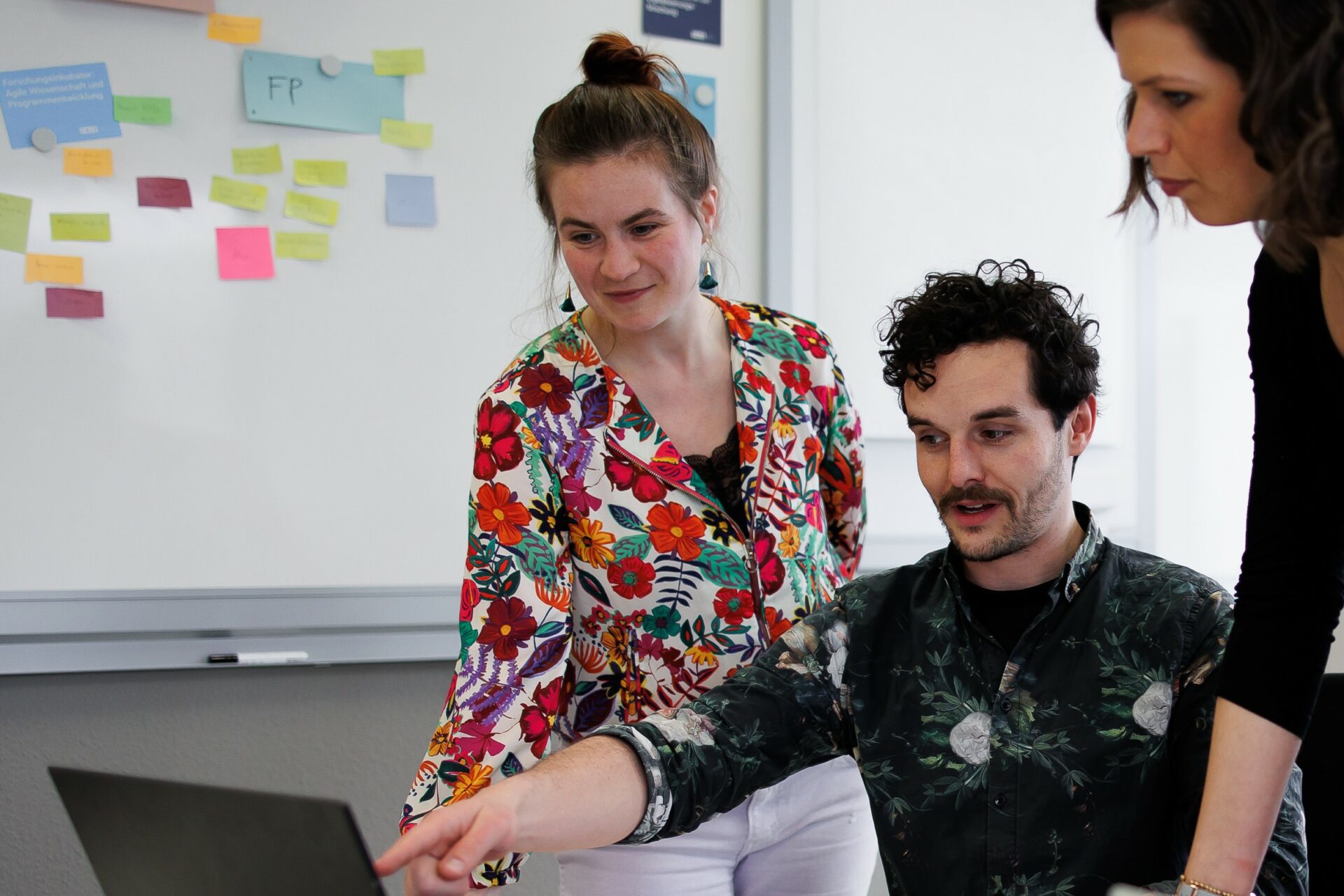Research Incubator: Digital Topic Sprints and Citizen Science

As an important part of the topic identification process for the research programs, the topic sprints are a participatory format at the end of the structured process.

Based on the previous steps in the process and the results of the online survey, four key themes emerged that were of great importance across the groups surveyed (experts, professional practitioners, and the general public):
- Ethical issues of machine learning (AI, algorithms, etc.)
- Sustainability & environmental protection in connection with digital technologies
- Security and data protection
- Education and digitization
You can find the visualization of the whole topic finding process in this video.
What moves the various representatives of society in detail?
In a next step, these four main topics were discussed and concretized with different stakeholders in so-called topic sprints. Among other things, this involved identifying overlaps, recurring cross-cutting topics, and finding detailed research approaches.
The topic sprints are compressed, co-creative workshop formats for interdisciplinary work. In keeping with the spirit of design-oriented Citizen Science, people with the most diverse backgrounds possible were specifically involved in the process. Participation and involvement had been mentioned again and again as important areas in the previous stages of topic identification and were to be taken into account in this way as part of the process. Furthermore, this approach follows the claim of CAIS to work in a people-centered and design-oriented way.
In seven groups to more than 400 different research potentials
In February 2021, 41 participants engaged in seven 90-minute interdisciplinary online workshops (Figure 1). The purposefully heterogeneous composition of the groups proved to be extremely productive. Everyday experiences with digital applications mixed inspiringly with special legal, sociological, artistic and strategic know-how. In this way, a large number of project ideas and differentiations of the four topics identified in the survey came about – on the one hand in collaborations and discussions on digital pinboards, and on the other hand in the context of independent brainwriting.
The result is a collection of approximately 400 different research potentials (Figure 1). These range from impulses for the interdisciplinary composition of research teams, to detailed research questions, to the formulation of initial design ideas for reallabs.
Figure 1. digital collaboration in the online workshop.
Participatory work across disciplines points to recurring cross-cutting themes
The central finding of many of the discussions was that technological aspects such as IT and software issues absolutely must be increasingly incorporated into digitization research.
Participation, involvement, media competence and questions about the design and impact of digital education emerged as recurring cross-cutting themes in the discussions. With regard to the topic of sustainability and environmental protection, the discussants were particularly interested in the sustainable design of digitization technologies and the promotion of environmental protection through digital technologies. With regard to the use of artificial intelligence in various areas of application (e.g., education, environmental protection), the participants discussed the effectiveness and dangers of such technologies in detail.
Consolidation into 13 thematic clusters as a basis for the selection of research programs and long-term thematic monitoring
The results of the thematic sprints were grouped into thematic milieus by two researchers in an inductive process. In the course of this, it was ensured that the ideas and approaches formulated by the participants were always related to the four overarching thematic areas. At the same time, possible overlaps with several areas were mapped.
In a further step, the suggestions were systematized and condensed into thirteen fact sheets on different areas of digitization research (e.g., environmental protection & AI, digital competence, design and digitization, see Figure 3, right margin). These each contain a guiding question as well as considerations on central research questions and possible real laboratories.
The fact sheets in turn form the basis for deciding on the first four CAIS research programs and thus the preliminary end of the first CAIS topic identification process. At the same time, the systematic collection, sorting, and condensation of the topics discussed are the starting point for long-term topic monitoring. With this, we want to map how opinions on digitization topics and their relevance from the perspective of the population change over the years.
Citizen Science
“Citizen Science involves the active participation of citizens at various stages of the research process in the humanities, natural sciences, and social sciences. Participation ranges from the generation of questions, the development of a research project, data collection and scientific evaluation to the communication of research results.” (Citizens Create Knowledge 2020)